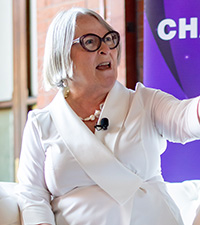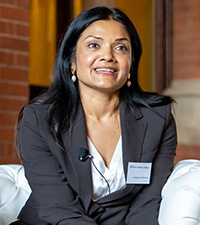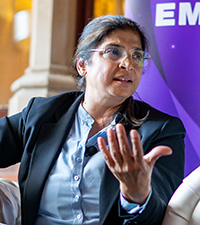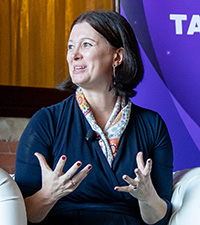Helping others get a rung on the ladder

After the awards presentation, moderator Caroline Stockman kicked off the panel session that explored mentorship and the importance of a career Plan B. The conversation also touched on how women are increasingly supporting woman progress up the career ladder. It concluded with a lively Q&A session, allowing attendees to share their experiences and ask questions.
Panellists reflected on the responsibility of leaders to take a chance on others lower down the career ladder. J.P Morgan Payments’ Ambareen Morshed, Head of Multinational Large Corporates Payment Sales, Europe and Africa, credited her career growth to people believing in her. “Leaders in my career that took a chance on me. You have to take a chance on someone to make a difference.”
The theme around supporting other women’s progress was echoed by Lata Gullapalli, Founder, Savoir Faire Company, whose work includes supporting Indian women living in rural areas gain the skills and tools to run their own businesses. “It is a way of bringing sustainable change,” she said. “It’s about giving them the tools to overcome barriers.”
One way that women can support other women manifests in coaching and mentoring, but panellists reflected that it’s often difficult to access coaching at large organisations. Cara Savas, European Regional Head of Sales for Corporate Clients with the Global Payments Solutions at HSBC, explained that she is involved in a coaching initiative at HSBC that advises people to find a mentorship network that acts like a corporate board – she said people should think of themselves as an enterprise.
“Look for people that can give you skills you don’t have yourself,” she said. “Don’t have three mentors from the same business. Pick out individuals that can guide you on different things.”

At J.P. Morgan Payments, one mentorship programme supports people from under privileged backgrounds navigate the bank’s application process for internships and graduate positions. “It’s a commitment for the mentor,” reflected Ambareen who said that the successful diversity programmes that truly avoid group think and “cookie cutter” candidates must start from the grass roots. She added that some of the most diverse teams at the bank include people from the military who bring a different attitude and energy to a team.
Straumann Group’s Group Treasurer, Joanna Bonnett, highlighted the transformative impact of mentorship and sponsorship in shaping careers. She emphasised the value of seeking guidance from mentors beyond one’s immediate team, noting that an external perspective can open new opportunities and broaden horizons. A trusted mentor or sponsor can help individuals recognise their strengths, navigate pivotal career decisions, and build the confidence to pursue advancement. Joanna reflected that conversations outside the workplace often spark fresh strategies and new ways forward, particularly at moments of transition or challenge, enabling professionals to thrive and realise their full potential.
Speaking up

Lata said many of the women she supports are reluctant to use their voice in a professional setting. She said change requires a combative mindset, courage, self-awareness and learning to find a way around to overcome barriers. “Sometimes you can’t break down the wall and like water, you have to flow around,” she says.
Lata shared other tools to navigate complicated professional situations.
Like others claiming your ideas as their own. “You can’t not share your ideas because as a woman you will be labelled uncooperative.” She suggested women always have additional ideas up their sleeve so they can support others – but also promote themselves. She said that once women learn to speak up, people “stop thinking of us as women and the magic starts.”
Taking time out for yourself
Panellists shared other strategies for coping in challenging working environments. Women should recognise that their situation and lives change through the years, impacting resilience and competency. Motherhood, the menopause or changes in women’s personal or financial life, can impact how women show up at work.
“What was right five years ago might not be right today,” said Joanna who flagged the strain of a long commute or a lack of sleep as issues faced by her mentees. “Stealing five minutes is hard but when we are at our lowest it is important to savour this kind of time.”
Advice also focused on the importance of distinguishing between what is and isn’t within women’s own remit to fix. It requires understanding the difference between broad issues and problems within our remit, she said.

“There is only so much you can control. Resilience is not about being tough and keeping going, it’s about planning how you run your life.” Joanna also counselled on the importance of women being their “best cheerleader” rather than “worst enemy” in a point that was later echoed by Lata who said that women should learn to trust their instinct to guide them to the right place.
In another strategy, panellists advised on the importance of a career Plan B.
Ambareen flagged that promotions are only awarded to those that truly show enthusiasm and commitment. “Gone are the days that just because you’ve been in the seat for a while you are owed a promotion,” she said. “Do you really love the job? If you are passionate and delivering, usually the promotion does come. Ask yourself, do you really want this and is it obvious to everyone around you?”
Ambareen said that in a typical workplace, the people who don’t support us move on, and we get another shot. But a Plan B is also important, however it requires nurturing and putting in place years before it might be needed. “It can’t just come at a time of crisis,” she said, reflecting that it requires a cultivated network backed up by a thoughtful process of where we see ourselves.
It led Cara to reflect on the dangers of tunnel vision when it comes to how we want our careers to flow: in reality life rarely works out as we plan. “Personal and family circumstances change and it’s important to build that resiliency,” she said. Her advice? Take stock and explore a different avenue if the role and management don’t fit. “No one is in control of you, you are in control,” she said.
Cara shared that over the course of her career she has learnt to ask herself if a specific role is helping her and if she is still learning. It has taught her to be selfish about her own needs; she no longer seeks to please everyone in an approach that has powered her career forward.
“The more ruthless you are with your time and what you invest in, the more successful you get.”
Helping each other and the importance of values
In a climate where it is easy to think progress in DEI has stalled, the conversation reflected on an important leap forward: women are supporting other women progress their careers.
Panellists also discussed the importance of staying true to their values.
For Ambareen this meant batting away criticism when she decided to move from her role in markets, to a new position in transaction banking. “I was told I was not ambitious. Can I not be ambitious about being a great parent? It ultimately boils down to values and what makes you happy.”

Cara added that authenticity is something we often hide. We strive to show colleagues that we are happy and shy away from revealing elements we find more challenging, especially early in our careers. She said that she actively encourages her team to apply for jobs to build their network; see if their skills are transferable and test wider career waters. People learn from going to different interviews; they learn about other teams and meet new people, she said.
In a similar approach, Ambareen encourages her team to step out of their comfort zone and take chances because they will only progress their career by taking a first step.
“I never would have envisaged myself where I am today,” she concluded.

